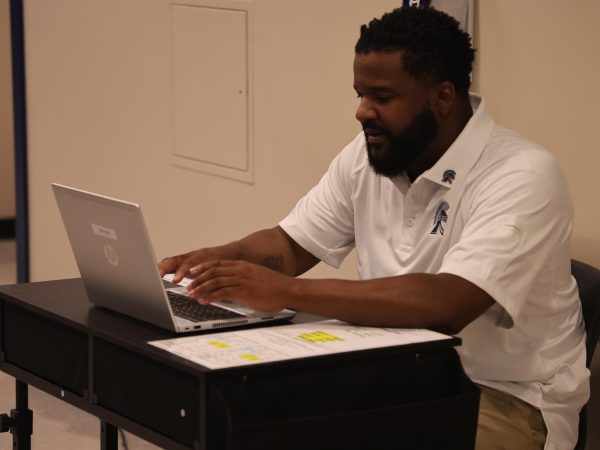New Excel brings new challenges
Significant changes to Excel lead to instability and disagreement
Photo by Allison Treanor
English teacher Emily Holmes engages with her excel class.
In her freshman and sophomore years, Lainy O’Neal (12) relied on Excel to practice for band. She would go to the band room every Tuesday and Thursday to practice viola and saxophone for the multiple ensembles she participated in.
But when she received the email a week before her senior year started that this year’s Excel would be assigned by grade level, and three days a week, she was freaking out.
For all high school students, Excel used to be a study hall on Tuesdays and Thursdays where students could go to any class to get help. This year, administration assigned students to a class by grade level and shifted the schedule to Mondays, Wednesdays and Fridays.
Associate Principal Ashley Schwarzbek said there were two factors to the decision. They included updated guidelines from the Ingham County Health Department that mandated schools to limit unstructured movement throughout the school day for contact tracing purposes, as well as recommendations from the state government that encouraged schools to prioritize student mental and academic recovery.
“We also recognized the added social-emotional benefits to all students [of] having dedicated space, to not only get additional instructional help, but also connect with their peers in their grade and have an adult in the building they could go to with questions or concerns,” Schwarzbek said.
But while state recommendations were taken into account in the schedule change, student reactions have been mixed.
Many upperclassmen, accustomed to the old Excel, relied on being able to choose their Excel teacher for academic support, like O’Neal. If you needed math help, you could go to your math teacher for one on one support. Now, students have to hope the Excel teacher they just met knows calculus.
“I am not a math person, like at all,” English teacher Emily Holmes said regarding her initial reaction to Excel. “I did wonder, how am I going to help some of these kids with classes I’m not familiar with?”
As a teacher, Holmes knows how to be flexible and has found creative solutions to help her students, even if she can’t do so directly.
“I’m a roll with it kind of gal,” Holmes said. “Today in Excel, I had a kid working on Algebra, so I said ‘Who in here is doing pretty well in Algebra right now?’ And I paired them up.”
But not every teacher is like Holmes, and Excel experiences vary based on the teacher. Because it would exceed teachers’ five-hour contracts, teachers aren’t expected to plan an Excel class.
For O’Neal, her experience is leaving her without the usual full support of Excel classes in the past.
“I’m not really getting any [academic help],” O’Neal said. “Just kind of figuring it out myself.”
These discrepancies from Excel to Excel are harmful to students.
“We don’t want to burden the students more,” Holmes said. “We actually want Excel to be a lightening of a burden.”
While some teachers feel the burden is being lightened, many students do not. For O’Neal, Excel feels like one more thing that just isn’t helpful.
“It’s felt like a waste of time,” O’Neal said. “It feels like the one thing we don’t have a choice in. It’s not teachers we have, it’s not kids that we know, we don’t have that peer to peer relationship or the work time that we’d have, it’s just frustrating.”
And like the rest of Excel planning, teachers have not been given full, clear instruction on what they’re actually supposed to be doing during Excel in the way of supporting students’ mental health.
“We’re not being asked to do anything that another trained person like a social worker or a therapist would do,” Holmes said. “It’s a formal, yet informal, way for us to be able to get even more students and then one more adult in the building that students have to reach out to.”
Still, Holmes acknowledged that “teachers are humans,” which comes with different strengths and levels of comfortability with social and emotional check-ins.
“There are definitely staff members who are not as comfortable talking about mental health, and issues that students are having,” Holmes said.
But for Holmes, the new eyes of her freshman Excel are helping her make the best out of an uncertain situation.
“I was talking to my Excel today,” Holmes said. “And overwhelmingly, they said that they really liked Excel, because they could check their phones, they could relax, they could catch up on homework. Almost every single kid in my Excel today said, ‘I like that it’s three days.’”
Freshman bring a new and unique perspective as the least attached to the former Excel, being used to the assigned Trojan Time.
“It’s not necessarily that they’re not seeing it clearly,” Holmes said. “It’s that maybe they are seeing it clearer than a lot of us, even the teachers.”
With the help of new perspectives, Holmes is rolling with the changes.
“I think that mental health-wise, and keeping up on assignments-wise, it’s good to have it like it is right now.”
Administration plans on holding Friday Family conversations to address student, parent and teacher concerns on various topics, giving students an opportunity to voice suggestions about Excel.

Allison Treanor is a member of the Class of 2023 and one of the staff writers for Portrait. This is her first year on staff as a sophomore. Allison’s...













